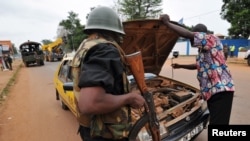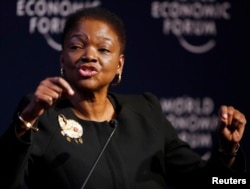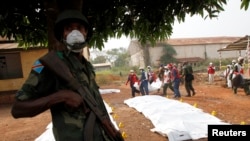BANGUI —
Aid agencies in the Central African Republic are facing a moral dilemma - should they evacuate endangered Muslims to safer areas, or encourage them to stay put? If they get involved in evacuations, they risk being accused of complicity with ethnic or religious "cleansing." But the alternative might be letting civilians fall victim to large-scale massacres.
The United Nations refugee agency (UNHCR) said Wednesday that “more than 15,000 people in 18 locations are surrounded by armed groups across the west of the Central African Republic… and at high risk of attack." It added that most of these people are Muslim.
A spokesman said the agency is particularly worried about the so-called PK12 neighborhood in Bangui and the towns of Boda, Bouar and Bossangoa.
Muslims trapped in PK12
About 3,200 Muslims are trapped in the kilometer-long district of PK12, surrounded by a hostile militia, the anti-Balaka, which has been firing grenades at them and killing people who try to leave the area.
Zannah Bassar, a grandmother, who is one of the beleaguered residents of PK12, told VOA she was born in this district, but the anti-Balaka are all around. She said her home has been wrecked, she’s been sleeping in a gutter for the past month and she wants to go somewhere else.
Half a dozen other Muslims interviewed by VOA in the same district all said they wanted to leave, either to go north into Chad or elsewhere within the CAR.
The U.N.’s senior humanitarian official, Valerie Amos, canvassed people’s views about relocation during her visit last week to Bossangoa, where some 1,200 Muslims have been living in and around a school for the past five months.
The town’s imam said if they don’t leave they risk being cut into little pieces.
A women’s group leader, Kadjidja Hassan, also addressed the humanitarian chief.
"The Muslims in Bossangoa don’t want to go to Chad, she said, because they are Central Africans, but they are suffering," she said. "A Muslim cannot go more than a kilometer from the site, she says. They are all packed in there and their husbands can’t do anything, so how can they live in Bossangoa?"
Chadian evacuation
In the past two months Chad’s government has been organizing large convoys, escorted by the Chadian army, to evacuate its citizens from CAR, but on February 20 Chad announced it was stopping these operations.
The announcement came after a day after a convoy left PK12 and was stopped by the anti-Balaka north of Bangui. The 21 men on board were all killed.
Peter Neussl, a U.N. humanitarian officer, says aid agencies are now considering organizing safer evacuation convoys, to places where people will be less at risk.
Up to now aid agencies have not been involved in evacuating people in the CAR, except some non-CAR citizens who have been flown out at the request of their governments, and some refugees who have been repatriated. Moving populations within the country is controversial.
Dilemma
Boubacar Gaye, the head of the U.N. political mission in the CAR, says security for civilians is the top priority - but adds the mission is against separation of the Muslim and non-Muslim populations.
"For the time being what is really at stake is the composition of this society, that was a multi- confessional one. It is very dangerous for the future of this country to have the Muslims in one part of this country, a kind of de facto partition. This is something that we should try to do our very best to avoid," he said.
The head of the U.N. Office for the Coordination of Humanitarian Affairs in the CAR, Barbara Shenstone, says aid agencies are in a good position to help organize future evacuations - and she suggests they may well be necessary.
"I think the best approach is to encourage reconciliation where this is possible. That being said, these people do need to be protected, they are fearing that they’re going to be massacred, and there is good evidence to suggest that if they’re not protected they might be massacred," she said.
Rights groups have called on the U.N., France, and African Union to deploy more peacekeepers to the CAR, to stabilize the country before situation grows any worse.
Images from Bangui
The United Nations refugee agency (UNHCR) said Wednesday that “more than 15,000 people in 18 locations are surrounded by armed groups across the west of the Central African Republic… and at high risk of attack." It added that most of these people are Muslim.
A spokesman said the agency is particularly worried about the so-called PK12 neighborhood in Bangui and the towns of Boda, Bouar and Bossangoa.
Muslims trapped in PK12
About 3,200 Muslims are trapped in the kilometer-long district of PK12, surrounded by a hostile militia, the anti-Balaka, which has been firing grenades at them and killing people who try to leave the area.
Zannah Bassar, a grandmother, who is one of the beleaguered residents of PK12, told VOA she was born in this district, but the anti-Balaka are all around. She said her home has been wrecked, she’s been sleeping in a gutter for the past month and she wants to go somewhere else.
Half a dozen other Muslims interviewed by VOA in the same district all said they wanted to leave, either to go north into Chad or elsewhere within the CAR.
The U.N.’s senior humanitarian official, Valerie Amos, canvassed people’s views about relocation during her visit last week to Bossangoa, where some 1,200 Muslims have been living in and around a school for the past five months.
The town’s imam said if they don’t leave they risk being cut into little pieces.
A women’s group leader, Kadjidja Hassan, also addressed the humanitarian chief.
"The Muslims in Bossangoa don’t want to go to Chad, she said, because they are Central Africans, but they are suffering," she said. "A Muslim cannot go more than a kilometer from the site, she says. They are all packed in there and their husbands can’t do anything, so how can they live in Bossangoa?"
Chadian evacuation
In the past two months Chad’s government has been organizing large convoys, escorted by the Chadian army, to evacuate its citizens from CAR, but on February 20 Chad announced it was stopping these operations.
The announcement came after a day after a convoy left PK12 and was stopped by the anti-Balaka north of Bangui. The 21 men on board were all killed.
Peter Neussl, a U.N. humanitarian officer, says aid agencies are now considering organizing safer evacuation convoys, to places where people will be less at risk.
Up to now aid agencies have not been involved in evacuating people in the CAR, except some non-CAR citizens who have been flown out at the request of their governments, and some refugees who have been repatriated. Moving populations within the country is controversial.
Dilemma
Boubacar Gaye, the head of the U.N. political mission in the CAR, says security for civilians is the top priority - but adds the mission is against separation of the Muslim and non-Muslim populations.
"For the time being what is really at stake is the composition of this society, that was a multi- confessional one. It is very dangerous for the future of this country to have the Muslims in one part of this country, a kind of de facto partition. This is something that we should try to do our very best to avoid," he said.
The head of the U.N. Office for the Coordination of Humanitarian Affairs in the CAR, Barbara Shenstone, says aid agencies are in a good position to help organize future evacuations - and she suggests they may well be necessary.
"I think the best approach is to encourage reconciliation where this is possible. That being said, these people do need to be protected, they are fearing that they’re going to be massacred, and there is good evidence to suggest that if they’re not protected they might be massacred," she said.
Rights groups have called on the U.N., France, and African Union to deploy more peacekeepers to the CAR, to stabilize the country before situation grows any worse.
Images from Bangui






